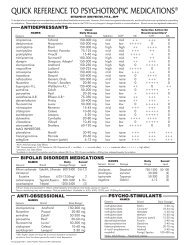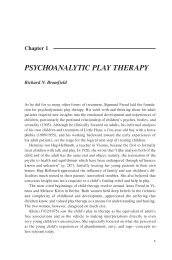IRAQ WAR CLINICIAN GUIDE
Iraq War Clinician's Guide - Network Of Care
Iraq War Clinician's Guide - Network Of Care
You also want an ePaper? Increase the reach of your titles
YUMPU automatically turns print PDFs into web optimized ePapers that Google loves.
Iraq War Clinician Guide 91 Appendix A<br />
the altered perceptions had on his emotions and behaviors. PMPS staff also assisted him in<br />
working through feelings of anger and reinforcing his coping strategies, identifying his strengths<br />
and assets.<br />
The initial Post-Deployment Health Assessment Tool was completed during SGT P's inpatient<br />
admission, approximately 16 days after his injury. At that time, he endorsed criteria for Major<br />
Depression and endorsed symptoms consistent with PTSD at the moderate level.<br />
Two months after admission, SGT P was discharged from the hospital and placed on convalescent<br />
leave. He had follow-up appointments in the Orthopedic and Vascular Clinics, Physical Therapy,<br />
and Preventive Medical Psychiatry. He stayed at base hotel for the duration of his outpatient<br />
therapy.<br />
PMPS staff followed SGT P on a regular basis during the course of the hospitalization and<br />
outpatient treatment, with visits ranging from 1-3 times per month. A combination of<br />
psychotherapy, hypnotherapy, and CBT interventions was provided. Ambien and propranol were<br />
not needed after the initial discharge medications were issued. He was able to regain control ovel<br />
the intrusive and arousal symptoms that he had been experiencing as a result of his deployment<br />
experience. Psychotherapeutic interventions assisted him in understanding the effect that his<br />
thoughts were having on his emotions and behavior and resulted in a substantial decrease in his<br />
endorsement of depressive symptoms (from 16 to 3 on the Pfizer, Prime MD Scale).<br />
Soldiers are contacted either by telephone or in person at the time of follow-up and are assessed<br />
for PTSD, Depression, Alcohol Usage, Somatic Complaints, Days of Poor Physical andlor Mental<br />
Health, Lost Productivity, and Satisfaction with Health Care. At the 3-month PDHAT follow-up<br />
visit, SGT P endorsed a depressed mood but did not meet the full criteria for depression. He<br />
endorsed depressive symptoms at a level 12 (a score of 10 or above is of concern). PTSD<br />
symptoms were endorsed at a moderate level. Although, he reported 9 days of poor mental and<br />
physical health during the previous month, he only reported 2 days of lost productivity due to poor<br />
mental or physical health. He reported excellent satisfaction with his health care. At the 6-month<br />
PDHAT follow-up visit, he endorsed depressive symptoms at a level 3 and did not meet the criteria<br />
for depression. He endorsed mild intrusive symptoms but did not meet criteria for PTSD.<br />
SGT P has returned to a light duty status while he continues to recover from his injuries.<br />
DEPARTMENT OF VETERANS AFFAIRS<br />
- "-<br />
NATIONAL CENTER FOR PTSD




